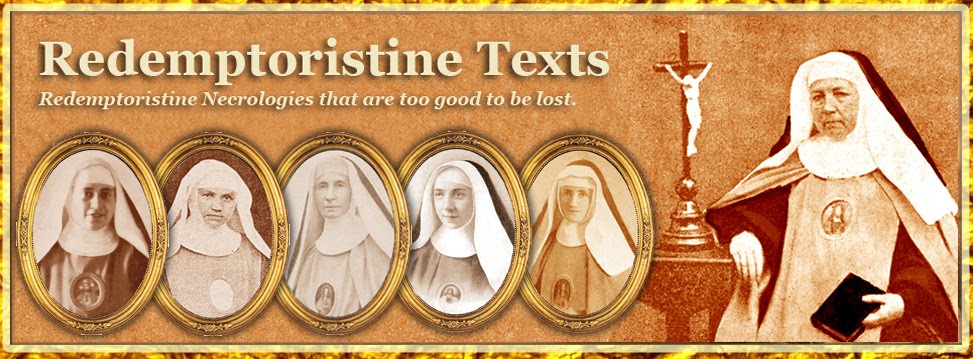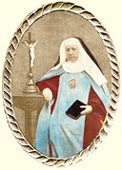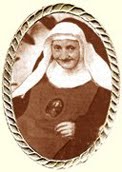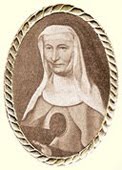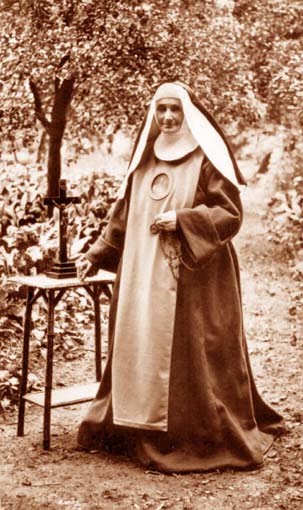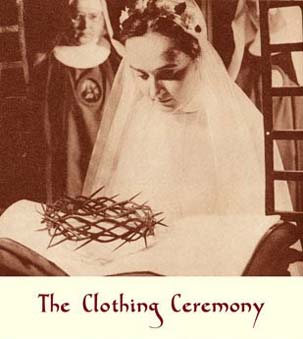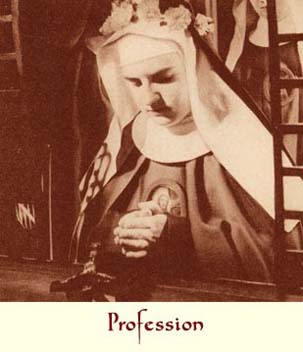Chapter IV. Death of Mother Marie-Philomena.
Homage rendered to her memory
Homage rendered to her memory
We continue with Mother Marie-Aloyse’s account:
“Our good Mother,” she says, “for some time had been having a presentiment of her approaching death. During that summer she said one day: “I believe my death is near, as I always feared that moment my whole life long, but now I desire it so much! My fears have gone, and I am thirsting to go and see the good Jesus! Oh, yes,” she continued, putting her hands together and looking up to heaven, “I want to see Him so much. I might not say much about it, but I love my good Jesus so much. Yes, I love Him with my whole heart.”
Mother Marie-Philomena’s health had already altered considerably. Our Mother was in a lot of pain and was suffering greatly. On the day of the Immaculate Conception (1878), she took communion and assisted at the holy mass and then retired to her room. Shortly afterwards she began vomiting. The doctor arrived about four o’clock in the afternoon and saw nothing serious in her state. But he had scarcely left when she started having a stroke. The doctor was recalled and ordered the last sacraments to be administered to the patient without delay. We had only enough time to transport our dear Mother to the infirmary, and the Rev. Canon Minne, our ordinary confessor, gave her Extreme Unction. The dear soul had lost her ability to speak, and we did not even know if she still retained consciousness. But what consoled us and edified us was hearing her murmuring the Ave Maria continually. She did this all night long, without stopping for a moment, and then we saw the proof of the words of our venerated Father Passerat that she loved to repeat to us: “If you contract the holy habit of always praying, you will do it even at the hour of your death, even without knowing it.” Her consciousness came back to her bit by bit, and our good Mother asked for the Very Rev. Father Kockerols, our extraordinary confessor, to be called urgently. He soon arrived, and she was very consoled by his presence. She made her confession and received Holy Communion. It was a touching spectacle to see this good Mother still trying to recite some part of her office. She never complained, nor asked for any comfort, and when she was asked if she felt all right, her reply was always: “Yes, I’m all right.” – or “I’m very well.” She said several times that she pardoned with all her heart all those who had caused her grief during her life, and her calm was so great that it could have been said that she was already enjoying heaven. – “You are suffering a great deal, my good Mother”, the Very Rev. Father Kockerols said to her. “Our Lord is sending you some very great sorrows.” - “Yes,” she replied, “but also some very great consolations.”
She assured the community that she would not forget them in heaven, recommended them several times to the Very Rev. Father Kockerols, and thanked him with a touching effusion for everything he had done for her. The Reverend Father, moved to tears, thanked her in his turn for what she had done for the Congregation. He assured her of everyone’s prayers, adding that, from now on, they would be interceding for her in all the houses in Belgium.
“Our dear Mother also had the consolation of receiving the benediction of Mons. Faict, the Bishop of Bruges, who esteemed her greatly, and who himself made haste to come to her to be informed of her condition as soon as he learnt of the painful blow we had received. On Thursday 12th December, in the evening, the Reverend Father Kockerols came once more to confess her, and then the Sisters went to receive her last blessing. The good Mother continually recited the Ave Maria, holding her Rosary in her hands, and from time to time making an effort to put it round her neck. Someone did this for her and she became calm. The dear soul was sinking visibly. At about eleven o’clock, the Rev. Father Kockerols recited the prayers of the dying, and on Friday 13th December 1878, at one o’clock in the morning, Mother Marie-Philomena peacefully rendered her beautiful soul into the hands of Him for whom she had worked so hard and suffered so much.
“The grief of the Community could not be described. We lost in her the best of Superiors, the most tender of Mothers, the friend and confident of us all. Each one of us hastened to pay our debt of gratitude to her by praying for her, and by promising to follow her counsels and examples.
“Mons. the Bishop wished to honour her funeral by his presence, to show the great esteem he had for our much beloved Mother. The family of the dear departed attended also, and, a remarkable thing, all the officers then in service in Bruges wished to pay our mother a tribute that no nun had ever received, so they all came to her funeral, wishing to demonstrate to M. the General of Savoy, the august brother of the deceased, that they too knew how to appreciate the virtues of the beloved sister whom he was mourning.”
To this touching biography that we have just read, we add some pious tributes emanating from men and women who knew Mother Marie-Philomena well.
In the first place we mention the funeral notice composed by the Very Rev. Father Kockerols:
“Our good Mother,” she says, “for some time had been having a presentiment of her approaching death. During that summer she said one day: “I believe my death is near, as I always feared that moment my whole life long, but now I desire it so much! My fears have gone, and I am thirsting to go and see the good Jesus! Oh, yes,” she continued, putting her hands together and looking up to heaven, “I want to see Him so much. I might not say much about it, but I love my good Jesus so much. Yes, I love Him with my whole heart.”
Mother Marie-Philomena’s health had already altered considerably. Our Mother was in a lot of pain and was suffering greatly. On the day of the Immaculate Conception (1878), she took communion and assisted at the holy mass and then retired to her room. Shortly afterwards she began vomiting. The doctor arrived about four o’clock in the afternoon and saw nothing serious in her state. But he had scarcely left when she started having a stroke. The doctor was recalled and ordered the last sacraments to be administered to the patient without delay. We had only enough time to transport our dear Mother to the infirmary, and the Rev. Canon Minne, our ordinary confessor, gave her Extreme Unction. The dear soul had lost her ability to speak, and we did not even know if she still retained consciousness. But what consoled us and edified us was hearing her murmuring the Ave Maria continually. She did this all night long, without stopping for a moment, and then we saw the proof of the words of our venerated Father Passerat that she loved to repeat to us: “If you contract the holy habit of always praying, you will do it even at the hour of your death, even without knowing it.” Her consciousness came back to her bit by bit, and our good Mother asked for the Very Rev. Father Kockerols, our extraordinary confessor, to be called urgently. He soon arrived, and she was very consoled by his presence. She made her confession and received Holy Communion. It was a touching spectacle to see this good Mother still trying to recite some part of her office. She never complained, nor asked for any comfort, and when she was asked if she felt all right, her reply was always: “Yes, I’m all right.” – or “I’m very well.” She said several times that she pardoned with all her heart all those who had caused her grief during her life, and her calm was so great that it could have been said that she was already enjoying heaven. – “You are suffering a great deal, my good Mother”, the Very Rev. Father Kockerols said to her. “Our Lord is sending you some very great sorrows.” - “Yes,” she replied, “but also some very great consolations.”
She assured the community that she would not forget them in heaven, recommended them several times to the Very Rev. Father Kockerols, and thanked him with a touching effusion for everything he had done for her. The Reverend Father, moved to tears, thanked her in his turn for what she had done for the Congregation. He assured her of everyone’s prayers, adding that, from now on, they would be interceding for her in all the houses in Belgium.
“Our dear Mother also had the consolation of receiving the benediction of Mons. Faict, the Bishop of Bruges, who esteemed her greatly, and who himself made haste to come to her to be informed of her condition as soon as he learnt of the painful blow we had received. On Thursday 12th December, in the evening, the Reverend Father Kockerols came once more to confess her, and then the Sisters went to receive her last blessing. The good Mother continually recited the Ave Maria, holding her Rosary in her hands, and from time to time making an effort to put it round her neck. Someone did this for her and she became calm. The dear soul was sinking visibly. At about eleven o’clock, the Rev. Father Kockerols recited the prayers of the dying, and on Friday 13th December 1878, at one o’clock in the morning, Mother Marie-Philomena peacefully rendered her beautiful soul into the hands of Him for whom she had worked so hard and suffered so much.
“The grief of the Community could not be described. We lost in her the best of Superiors, the most tender of Mothers, the friend and confident of us all. Each one of us hastened to pay our debt of gratitude to her by praying for her, and by promising to follow her counsels and examples.
“Mons. the Bishop wished to honour her funeral by his presence, to show the great esteem he had for our much beloved Mother. The family of the dear departed attended also, and, a remarkable thing, all the officers then in service in Bruges wished to pay our mother a tribute that no nun had ever received, so they all came to her funeral, wishing to demonstrate to M. the General of Savoy, the august brother of the deceased, that they too knew how to appreciate the virtues of the beloved sister whom he was mourning.”
To this touching biography that we have just read, we add some pious tributes emanating from men and women who knew Mother Marie-Philomena well.
In the first place we mention the funeral notice composed by the Very Rev. Father Kockerols:
J. M. J. A.
Do not forget the teachings of your Mother (Prov. 1:8).
She was a true daughter of Saint Alphonsus. She drummed into us unceasingly through her words and her examples the true spirit of our holy Founder:
The spirit of faith, which makes us live a supernatural and divine life here below.
The spirit of prayer, which maintains our souls in continual communication with God.
The spirit of humility and simplicity, the distinctive characteristic of our holy Founder and his true disciples.
The spirit of sacrifice and abnegation, which produces forgetfulness of self and the most entire devotion to the interests of Jesus.
The spirit of love, ardent love for Our Lord; a tender love for Mary; a love full of zeal for the Church and souls, especially for the most abandoned souls.
The spirit of submission in everything to the divine will. It will make us repeat on every occasion the sacred words that our venerated Superior and much beloved Mother repeated so often during her life and at her death:
She was a true daughter of Saint Alphonsus. She drummed into us unceasingly through her words and her examples the true spirit of our holy Founder:
The spirit of faith, which makes us live a supernatural and divine life here below.
The spirit of prayer, which maintains our souls in continual communication with God.
The spirit of humility and simplicity, the distinctive characteristic of our holy Founder and his true disciples.
The spirit of sacrifice and abnegation, which produces forgetfulness of self and the most entire devotion to the interests of Jesus.
The spirit of love, ardent love for Our Lord; a tender love for Mary; a love full of zeal for the Church and souls, especially for the most abandoned souls.
The spirit of submission in everything to the divine will. It will make us repeat on every occasion the sacred words that our venerated Superior and much beloved Mother repeated so often during her life and at her death:
Fiat voluntas tua!
May Thy will be done!
May Thy will be done!
A letter by Rev. Father Inghels, dated 3rd January 1879, and addressed to Mother Marie-Aloyse, renders in its turn, in expressive terms, a beautiful homage to the virtues of the deceased:
“We have placed our vows for the new year for our good Sisters of Bruges into the Manger of the Child Jesus. May the Convent in Saint Catherine Street always remain what it has been so far, a joyous vestibule of Paradise! You are there, happy spouses of Jesus Christ, unceasingly praising your well-beloved Saviour, counting no longer for anything from the world that you have left, rejoicing already in the charity that brings you something of the ineffable bliss that awaits you. From time to time, the Angel of deliverance comes to say: “Come, Bride of Christ!” And then, for the happy elect, Paradise opens, and she enters into the eternal beatitude, and receives the crown that the Lord has prepared for her. Oh, undoubtedly, my dear Sister, for those who must still wait in the vestibule, the separation is painful, but what a great consolation to be able to say to yourself: ‘She is happy, and we, sometime later, will go to rejoin her!’
“You can say this, my good Sister, every time your divine Spouse invites a member of your happy community, but can you now not add that your good Mother Marie-Philomena has had the good fortune to be invited? Oh, how beautiful must her crown be! Has she not served the divine Providence as a docile instrument to form the sanctity of a huge number of souls? Do you not owe to her the fervour that reigns amongst you? Did she not bear her name well, and was she not truly a most adorable Providence for each one of you? And not content to take care of you, what did she not do for those whom Providence has brought into the vestibule? Ah, if the grilles of your convent could only speak! What acts of charity practised by Mother Philomena would be revealed! How fitting it was to choose as the text on her mortuary card the words of Saint Augustine: “Pious towards God, affectionate and tender towards her own, benevolent towards all those who approached her”, and the word of Ecclesiastes: “She loved God and mankind and her memory is a blessed one.”
“This is so true of our good Mother Marie-Philomena. After such a life, it is not astonishing that her end was so beautiful.”
Let us now listen to some pious Redemptoristines who knew their venerated Mother well:
“Our dear Mother Marie-Philomena,” said one of them, “always appeared to me as a holy Superior whose power and meekness made her government just like what our Father Saint Alphonsus describes about the perfect Superior. She had a great devotion to the Divine Office, which she accompanied with so much devotion. She was always ready to console her daughters, and even the least of them had recourse to her with confidence.”
Another one writes: “I remember our good Reverend Mother as always sweet and smiling. You could never spend time with her (even if you were burdened or were not feeling well) without feeling yourself changed. Whatever it was regarding her, everything disappeared and changed in front of her kindliness, as if an angel suddenly appearing chased away all the demons. She helped the souls of her children pass through the thorns of great trials without being torn by them. She sometimes told me at the beginning: “Do not be one of those religious who must be handled with gloves on.”
Finally, a third witness to the virtues of this good Mother gives us a portrait drawn of the deceased in the following lines:
“As for our much beloved Mother Marie-Philomena, who received me into the community of Bruges, what I particularly admired in her, from the very first day I had the pleasure of meeting her, was a supernatural quality of soul which was never shaken even in the midst of the greatest pains and difficulties. One day when I expressed my admiration to her on the subject of her imperturbable patience, she replied: “My dear child, if the good God wants something or permits it, why would we wish otherwise?”
The charm that grace gave to her energy attracted all hearts to her so she could bring them to God. I have in my hands some lines written by this venerated Mother. Here is a copy of them, in case they can be of use.
“You have asked me, my dear little Sister M., for some lines of consolation: here is my reply. Before all, dear child, I wish you to have courage. Even well before the invention of the railway, Saint Teresa said that with courage you could go a hundred leagues an hour. Courage is therefore the electric telegraph of the spiritual life. And why go on foot or by a postal van when we have the railway or the telegraph at our disposition?
“I see that you still have a trace left of your ancient infirmity: discouragement. Mister Darkness is trying to make use of it, so send him packing. For the rest, we must never be discouraged or dismayed when we see ourselves still imperfect. We cannot become a saint in one day, and God is pleased to leave us a feeble and vulnerable side so that we can constantly be humbled and feel the enormous need that we have of Him. In your temptations, never think of the temptation, but of Jesus Christ and Mary; and in general, when your spirit wishes to dream, reflect and consider, fasten your glance with good humour on the adorable figure of Jesus Christ who is in you, and His holy Mother who is beside you. There you will find what you should dream of for all eternity.”
“We have placed our vows for the new year for our good Sisters of Bruges into the Manger of the Child Jesus. May the Convent in Saint Catherine Street always remain what it has been so far, a joyous vestibule of Paradise! You are there, happy spouses of Jesus Christ, unceasingly praising your well-beloved Saviour, counting no longer for anything from the world that you have left, rejoicing already in the charity that brings you something of the ineffable bliss that awaits you. From time to time, the Angel of deliverance comes to say: “Come, Bride of Christ!” And then, for the happy elect, Paradise opens, and she enters into the eternal beatitude, and receives the crown that the Lord has prepared for her. Oh, undoubtedly, my dear Sister, for those who must still wait in the vestibule, the separation is painful, but what a great consolation to be able to say to yourself: ‘She is happy, and we, sometime later, will go to rejoin her!’
“You can say this, my good Sister, every time your divine Spouse invites a member of your happy community, but can you now not add that your good Mother Marie-Philomena has had the good fortune to be invited? Oh, how beautiful must her crown be! Has she not served the divine Providence as a docile instrument to form the sanctity of a huge number of souls? Do you not owe to her the fervour that reigns amongst you? Did she not bear her name well, and was she not truly a most adorable Providence for each one of you? And not content to take care of you, what did she not do for those whom Providence has brought into the vestibule? Ah, if the grilles of your convent could only speak! What acts of charity practised by Mother Philomena would be revealed! How fitting it was to choose as the text on her mortuary card the words of Saint Augustine: “Pious towards God, affectionate and tender towards her own, benevolent towards all those who approached her”, and the word of Ecclesiastes: “She loved God and mankind and her memory is a blessed one.”
“This is so true of our good Mother Marie-Philomena. After such a life, it is not astonishing that her end was so beautiful.”
Let us now listen to some pious Redemptoristines who knew their venerated Mother well:
“Our dear Mother Marie-Philomena,” said one of them, “always appeared to me as a holy Superior whose power and meekness made her government just like what our Father Saint Alphonsus describes about the perfect Superior. She had a great devotion to the Divine Office, which she accompanied with so much devotion. She was always ready to console her daughters, and even the least of them had recourse to her with confidence.”
Another one writes: “I remember our good Reverend Mother as always sweet and smiling. You could never spend time with her (even if you were burdened or were not feeling well) without feeling yourself changed. Whatever it was regarding her, everything disappeared and changed in front of her kindliness, as if an angel suddenly appearing chased away all the demons. She helped the souls of her children pass through the thorns of great trials without being torn by them. She sometimes told me at the beginning: “Do not be one of those religious who must be handled with gloves on.”
Finally, a third witness to the virtues of this good Mother gives us a portrait drawn of the deceased in the following lines:
“As for our much beloved Mother Marie-Philomena, who received me into the community of Bruges, what I particularly admired in her, from the very first day I had the pleasure of meeting her, was a supernatural quality of soul which was never shaken even in the midst of the greatest pains and difficulties. One day when I expressed my admiration to her on the subject of her imperturbable patience, she replied: “My dear child, if the good God wants something or permits it, why would we wish otherwise?”
The charm that grace gave to her energy attracted all hearts to her so she could bring them to God. I have in my hands some lines written by this venerated Mother. Here is a copy of them, in case they can be of use.
“You have asked me, my dear little Sister M., for some lines of consolation: here is my reply. Before all, dear child, I wish you to have courage. Even well before the invention of the railway, Saint Teresa said that with courage you could go a hundred leagues an hour. Courage is therefore the electric telegraph of the spiritual life. And why go on foot or by a postal van when we have the railway or the telegraph at our disposition?
“I see that you still have a trace left of your ancient infirmity: discouragement. Mister Darkness is trying to make use of it, so send him packing. For the rest, we must never be discouraged or dismayed when we see ourselves still imperfect. We cannot become a saint in one day, and God is pleased to leave us a feeble and vulnerable side so that we can constantly be humbled and feel the enormous need that we have of Him. In your temptations, never think of the temptation, but of Jesus Christ and Mary; and in general, when your spirit wishes to dream, reflect and consider, fasten your glance with good humour on the adorable figure of Jesus Christ who is in you, and His holy Mother who is beside you. There you will find what you should dream of for all eternity.”
This necrology is translated from Fleurs de l'Institut des Rédemptoristines by Mr John R. Bradbury. The copyright of this translation is the property of the Redemptoristine Nuns of Maitland, Australia. The integral version of the translated book will be posted here as the necrologies appear.


